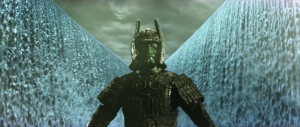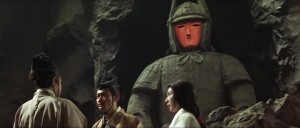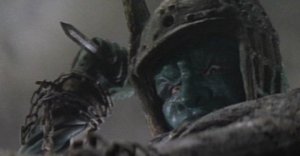
I have heard tales of this trilogy for some time. I have never heard of any series of films that is so highly regarded in its own genre, and yet surprisingly so often overlooked as Daiei's "Daimajin" trilogy. However, after watching all three films, and I understand why it is seen this way.
From my background, the "Daimajin" trilogy was looked at as a group of giant monster films, when they are only monster movies for about ten minutes out of their eighty minute runtime. The rest of that time is spent in Feudal Japan and is more akin to a samurai film than a daikaiju flick. The plot of each of these three films differs slightly from the other, but they generall follow the same pattern - Set in the age of shoguns and samurai warlords, an evil faction rises up to claim power over another castle or neighboring village. The conquering gangs are ruthless and spare no one, as they slay even women and children that stand in their way. But the warlords and villagers continue to believe in God, who will make everything right again. The attackers don't believe in God and think everyone is foolish for believing in these superstitions. Just as things seem to be at their worst, with one last sacrificial pray, their God manifests himself as a massive, indestructible stone statue, ready to save those who believed in him from evil.

I admire these films for being able to seamlessly blend together period pieces with the daikaiju genre, while also having a strong religious message. While they do refer to this creature as "God," they never mention what religion these people worship, or where they got it from. In fact, it could be argued that this creature isn't even a God, just a monster who is loyal to those who are willing to make great sacrifices. In the first film, "Daimajin," it is said there is a monster inside the mountain and the statue of God is the only thing keeping the monster from breaking free. By the end of the film, their monument is destroyed and the Daimajin is running loose.
However, for these same reasons, I can see why most monster movie fans haven't seen the "Daimajin" films. They have only a few monster scenes, and those moments occur at the end of the samurai film about a struggle for power, and the strong religious message might throw some people off. I kept forgetting these films existed until I saw a physical copy in a Japanese-specialty store. No one talks about them and they are generally forgotten among other daikaiju films and the movies of Akira Kurosawa.
Yet those who have seen them genuinely enjoy them, myself included. Even if we hardly see the monster, there is this constantly looming threat that God might strike at any moment, especially in the second film, "Return of Daimajin." That while the samurai's and villagers have their feud, some are convinced that God will avenge the lives that have been lost.

But my favorite addition to these films was the soundtrack, created by the always wonderful Akira Ifukube. He is well-known for composing the soundtrack to many of Toho's monster films, including over 10 different Godzilla films. The sound of a monster film is just as important as the look of one, especially when the soundtrack can be as booming and powerful as the monster itself. Ifukube tended to create music that enhanced already powerful scenes, and he puts that to use in all three "Daimajin" movies. His music is always noticeable and its gives each scene the emotional punch it needed.
Out of the three films, I found the second film, "Return Of Daimajin" to be the best one. It has a similar plot to the first film, but this time the rival clan destroys the natives statue of God as a sign to show how powerless they are compared to this clan. But throughout the film, the Majin sneaks up on the troublemakers, sinking their boats into the water and providing fog as cover. This made the film more of a revenge tale, as the God seeks out those who would destroy him.

The weakest was certainly the last of the three films, "Daimajin Strikes Again." This one follows a group of four children as they climb God's mountain to save their fathers and some loggers from some douche building "weapons" (we never learn what these weapons are or why he needed so many men to build them). While the first two films were about the chaos of Feudal Japan and the need for power in that era, this one was about four kids with little character on a journey, with some monster scenes at the end. It has more in common with the 1960s cheesy Gamera films than the other two "Daimajin" films.
Overall, if you like daikaiju films and want to see something different, give the "Daimajin" trilogy a try. All three have wonderful cinematography, are well-paced and boast a score by Akira Ifukube. It amazes me that all three films came out in 1966, and yet are so expertly-crafted, blending together two vastly different genres into something unique and worth checking out.
Final Grades -
"Daimajin" - B
"Return of Daimajin" - B+
"Daimajin Strikes Again" - C+

No comments:
Post a Comment